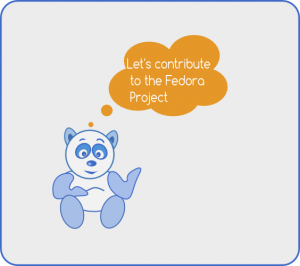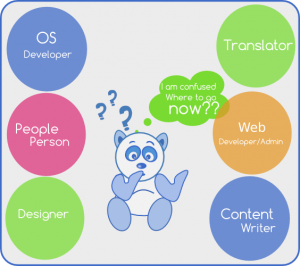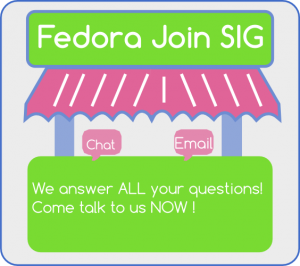Ankursinha (talk | contribs) |
Ankursinha (talk | contribs) No edit summary |
||
| Line 1: | Line 1: | ||
== | == Aim == | ||
The Fedora Join SIG aims to set up and maintain channels that let prospective contributors engage with the community. The idea here is to enable people looking to join the Fedora community to converse with existing members, make friends, find mentors, and get a feeling of what and how the community does in general, with a view to reduce the learning gradient that joining a new community entails - and make it more enjoyable! | |||
Different teams already have different, mostly well documented, join SOPs (standard operating procedures). The infrastructure team is a great example of this. However, we often meet people who are unsure of how their skills fit into the community. We want to provide these people a channel where they can speak to existing members of the community, learn about what they do and use this information to find the right team to get started with. We help new members form relationships with members; we point them to the right resources - wiki or otherwise; and we expect that this should greatly improve the joining experience. | |||
So, our goals are to: | |||
# set up a communication channel between the existing contributors and prospective contributors. Speaking to current team members is always encouraging. We could even set up a system to send "easyfix" tasks to this mailing list giving folks a chance to work on them and learn in the process. | |||
# guide/aid prospective contributors to turn into solid contributors. Rather than just pointing them to join.fp.o, talk to them, see what issues they face, help them decide where they want to get started. | |||
# to form better mentor-mentee relationships. Here, I mean "mentor" in the real sense of the word. | |||
# give prospective contributors a communication channel to converse amongst themselves. This is very important. Take the Google Summer of Code mailing list for instance. It is set up specifically so that the candidates can talk to each other. Since they're all in the same boat, they feel more comfortable discussing certain issues amongst themselves. They'll also be aware of what different people are up to which will give them a better idea of what they can do. It would be great if they could discuss and share the cool stuff they've begun to do. It would surely be encouraging. | |||
Basically, look for '''potential''', not '''polish'''. We can help them gain the polish that established contributors have. | |||
==IRC== | ==IRC== | ||
| Line 36: | Line 21: | ||
The list is also mirrored at [[http://gmane.org/ Gmane]] as [[http://dir.gmane.org/gmane.linux.redhat.fedora.join gmane.linux.redhat.fedora.join]] - accessible via web browser as well as NNTP. | The list is also mirrored at [[http://gmane.org/ Gmane]] as [[http://dir.gmane.org/gmane.linux.redhat.fedora.join gmane.linux.redhat.fedora.join]] - accessible via web browser as well as NNTP. | ||
==Members== | ==Members== | ||
| Line 57: | Line 34: | ||
==IRC Meetings== | ==IRC Meetings== | ||
[http://meetbot.fedoraproject.org/fedora-meeting/2014-04-16/fedora_join_irc_meeting.2014-04-16-09.07.log.html Meeting-2014-04-16] | [http://meetbot.fedoraproject.org/fedora-meeting/2014-04-16/fedora_join_irc_meeting.2014-04-16-09.07.log.html Meeting-2014-04-16] | ||
==Artwork== | |||
[[User:Niteshnarayan|Nitesh Narayan Lal]] made some cool artwork for us! | |||
[[File:s1.png|300px|center]] | |||
[[File:s2.png|300px|center]] | |||
[[File:s3.png|300px|center]] | |||
[[Category:SIGs]] | [[Category:SIGs]] | ||
Revision as of 15:32, 29 August 2016
Aim
The Fedora Join SIG aims to set up and maintain channels that let prospective contributors engage with the community. The idea here is to enable people looking to join the Fedora community to converse with existing members, make friends, find mentors, and get a feeling of what and how the community does in general, with a view to reduce the learning gradient that joining a new community entails - and make it more enjoyable!
Different teams already have different, mostly well documented, join SOPs (standard operating procedures). The infrastructure team is a great example of this. However, we often meet people who are unsure of how their skills fit into the community. We want to provide these people a channel where they can speak to existing members of the community, learn about what they do and use this information to find the right team to get started with. We help new members form relationships with members; we point them to the right resources - wiki or otherwise; and we expect that this should greatly improve the joining experience.
So, our goals are to:
- set up a communication channel between the existing contributors and prospective contributors. Speaking to current team members is always encouraging. We could even set up a system to send "easyfix" tasks to this mailing list giving folks a chance to work on them and learn in the process.
- guide/aid prospective contributors to turn into solid contributors. Rather than just pointing them to join.fp.o, talk to them, see what issues they face, help them decide where they want to get started.
- to form better mentor-mentee relationships. Here, I mean "mentor" in the real sense of the word.
- give prospective contributors a communication channel to converse amongst themselves. This is very important. Take the Google Summer of Code mailing list for instance. It is set up specifically so that the candidates can talk to each other. Since they're all in the same boat, they feel more comfortable discussing certain issues amongst themselves. They'll also be aware of what different people are up to which will give them a better idea of what they can do. It would be great if they could discuss and share the cool stuff they've begun to do. It would surely be encouraging.
Basically, look for potential, not polish. We can help them gain the polish that established contributors have.
IRC
- #fedora-join[?] - Talk to contributors and get help getting started with contributing to Fedora
Mailing list
The list is also mirrored at [Gmane] as [gmane.linux.redhat.fedora.join] - accessible via web browser as well as NNTP.
Members
Please refer to the FAS group to see a list of contributors helping out - https://admin.fedoraproject.org/accounts/group/view/fedora-join
TO DO List
- File ticket at infra to set up fedora-join mailing list. (Is it possible to set up one where they won't need to register) Done! https://fedorahosted.org/fedora-infrastructure/ticket/3344
- Set up IRC channel #fedora-join: Done! Go hang out there now!
- File ticket with websites SIG to make tiny changes to join.fp.o to list Fedora-Join IRC and mailing list channels. Done! https://fedorahosted.org/fedora-websites/ticket/116
- Ask infra if we can set up a system to send "easyfix" notifications to the channel/mailing list.
- Get started!
IRC Meetings
Artwork
Nitesh Narayan Lal made some cool artwork for us!



